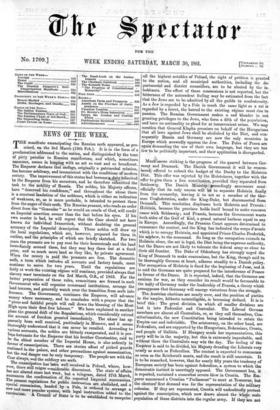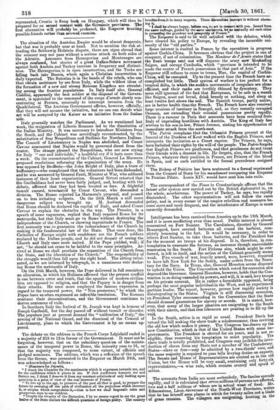Muo ore striking is the progress of the quarrel between
Ger- many and Denmark. The Danish Government it will be remem- bered; offered to submit the budget of the Duchy to the Holstein Diet. This offer was rejected by the Holsteiners, together with the offer to give them a free constitution, provided they separated from Schleswig. The Danish Mlistilpicordingly announces semi- officially that its only course will 'btt to separate Holstein finally from the monarchy, leaving it to act as a member of the Ger- man Coufederation, under the King-Duke, but disconnected from Derimarl. This resolution displeases both Holstein and Prussia : Holstein, because the province holds itself bound to make common cause with Schleswig; and Prussia, because the Government wants both sides of the Gulf of Kiel, a grand natural harbour equal to any in Europe. Accordingly, the Prussian Court appears determined to commence the contest, and the King has indicated the corps d'armee which is to occupy Holstein, and appointed Prince Charles Frederick, his nephew, to the command. So long as the occupation extends to Holstein alone, the act is legal, the Diet being the supreme authority, but the Danes are not likely to tolerate the federal army so close to their old frontier. The Duke of Oldenburg has strongly urged the King of Denmark to make concessions, but the King, though said to be thoroughly German at heart, adheres steadily to a Danish policy. The occupation of Holstein is fixed for the beginning of June, and it is said the Germans are quite prepared for the interference of France in favour of the Danes. It is reported, indeed, that the Germans are anxious for war, as they consider its result would be favourable to. the unity of Germany wider the leadership of Prussia, a theory which presupposes that Germany will emerge victorious from the struggle.
The Austrian elections are nearly over, and the position of parties in the empire, hitherto unintelligible, is becoming defined. It is in brief this : The great division in which all smaller divisions are lost is into Federalist and Centralist. The Liberal German members are almost all Centralists, or, as they call themselves, Con- stitutionalists, the new Constitution being intended to retain the Empire one and indivisible. The aristocracy, on the other hand, are Federalists, and are supported by the Hungarians, Bohemians, Croats, and people of Galicia. If Hungary sends her representatives, this party will be in the majority, but this is extremely improbable, and. without them the Centralists may win the day. The feeling of the' Emperor is said to be divided, his Majesty dreading the Liberals very nearly as much as Federalism. The contest is expected to commence as soon as the Reichsrath meets, and the result is still uncertain. It is to be remarked, however, that for nearly fifty years the tendency of European society has been against federalism, a system to which the democratic instinct is unerringly opposed. The Government has, it is reported, sustained a somewhat severe blow in Croatia. The Em- peror summoned a Croatian "Parliament" to meet at Temesvar, but the electors' first demand was for the representation of the military colonies. If they are represented, Croatia will undoubtedly protest against the conscription, which now draws almost the whole male population of these districts into the regular army. If they are not
possible friends rather than avowed enemies. ing the grandeur and prosperity of Fraace.'































